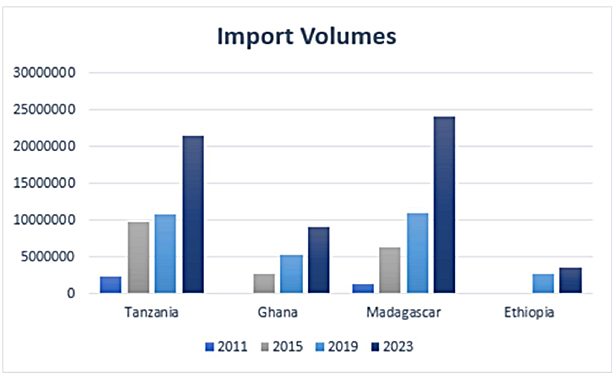June 05, 2024
SanMar Executive Advocates for AGOA Renewal Before Senate Finance Committee
Melissa Nelson said the soon-to-expire African Growth and Opportunity Act enables a production chain for domestic apparel providers that supports jobs in the U.S. while helping bring people abroad out of poverty.
When SanMar (asi/84863) started manufacturing at a location in Tanzania in 2009, the factory was practically the only building in the area, Melissa Nelson, general counsel for the Top 40 promo supplier, testified before the U.S. Senate Finance Committee on Wednesday, June 5.
Fifteen years later, the entire local economy has transformed, she said. Restaurants, a moped shop, hair and nail salons – all these have cropped up to cater to factory workers who now have disposable income, Nelson told the senators.

Melissa Nelson, SanMar (asi/84863)
“The transformation has been remarkable, but it would not have happened without the African Growth and Opportunity Act creating the incentive for SanMar to move production from China to Tanzania,” Nelson said.
The anecdote, Nelson said, is representative of a broader phenomenon: AGOA has enabled a supply chain that’s helped lift many African workers out of poverty while supporting U.S. commerce and domestic employment. And that’s why, she told the Finance Committee, Congress should extend AGOA. First implemented in 2000, the act is due to sunset next year. The AGOA Renewal and Improvement, introduced with bipartisan support in the Senate this year, would extend the act to 2041.
Nelson said the sub-Saharan African countries covered by the AGOA trade program have incredible potential for further production development, but U.S.-based businesses – including SanMar and other apparel providers in promo – need the stability of a long-term act renewal to create a sustainable manufacturing base in the region.
“Staring down the expiration date has put any potential investments on hold for the past few years,” Nelson said. “And we are missing an incredible window of opportunity. There is so much potential in manufacturing expansion and vertical integration, but companies are hesitant to invest when the benefits of AGOA could expire before a return on investment.”
58 Million
Number of apparel pieces SanMar imported from AGOA countries last year.
Domestic and Overseas Impacts
AGOA provides trade preferences for quota and duty-free entry into the United States for certain goods. In particular, AGOA expanded market access for textile and apparel goods into the United States for eligible African countries. This has resulted in the growth of an apparel industry in southern Africa – a job stoker.
SanMar has been among the employers. Its production in five AGOA countries provides jobs for over 9,000 Africans – 70% to 80% of whom are women. “Entire families are pulled out of poverty and their living standards are increased,” Nelson said.
Last year, SanMar imported more than 58 million pieces of apparel from AGOA countries, primarily Tanzania, Madagascar and Ghana. Nelson said Africa-based manufacturing was pivotal to helping SanMar provide quality, cost-effective apparel to its 65,000 customers, thereby supporting those small businesses and their communities across the United States. All that enabled family-owned SanMar to employ more than 5,000 people across nine U.S. states.

SanMar import volumes from AGOA-eligible countries.
GSP Discussed Too
Nelson also spoke in favor of renewing the Generalized System of Preferences.
GSP is a trade program that provides nonreciprocal, duty-free treatment for certain U.S. imports from eligible developing countries. It expired at the end of 2020. A frequent past practice by Congress has been to let GSP lapse and then retroactively extend the program from the expiration date, enabling importers to be refunded for duties incurred during the lapse.
After GSP was authorized to include travel goods, SanMar began sourcing eligible products such as backpacks, duffel bags and luggage from GSP countries such as Indonesia, Myanmar and the Philippines – around 2017. “Because of GSP eligibility, we were able to develop and source a variety of products from GSP countries that would likely have originated in China,” Nelson said.
When GSP expired in 2020, SanMar, after consulting experts, decided to keep sourcing from these GSP nations, believing it would be renewed quickly. It wasn’t. “That decision has cost us millions of dollars – millions that could have been invested in bringing additional value to our customers,” said Nelson. “SanMar continues to source from GSP countries with the hope that (GSP) will be reauthorized soon and SanMar will receive the reimbursement that can be invested back in our business.”
AGOA Renewal Act
U.S. Senators Chris Coons (D-Del.) and James Risch (R-Idaho) have introduced the AGOA Renewal Act of 2024. It would:
- Extend AGOA by 16 years, pushing back the program’s expiration from 2025 to 2041. The timeline mirrors the 16-year sunset provision included in the U.S.-Mexico Canada Agreement.
- Streamline the AGOA eligibility review process to ensure that any enforcement action is “timely, fair and clearly communicated.”
- Integrate AGOA with the African Continental Free Trade Agreement to support the development of intra-African supply chains.
- Incentivize AGOA beneficiaries to develop a “utilization strategy” to increase exports under the program.
While renewal has garnered bipartisan support, the particulars have been a point of discussion. For instance, eligibility criteria is one area of focus. Some want the adoption of new eligibility criteria to include issues like human rights, gender equality, environmental standards, good governance and digital trade.